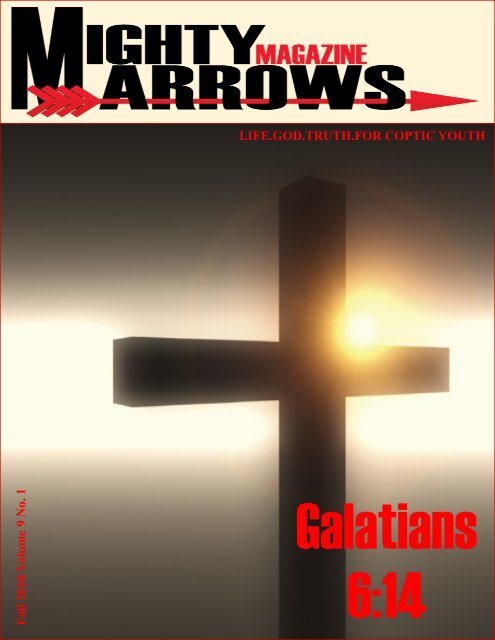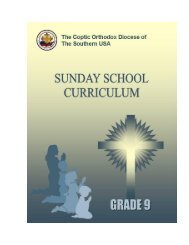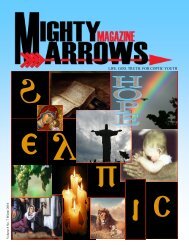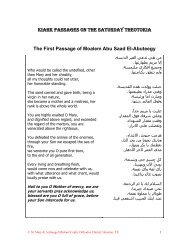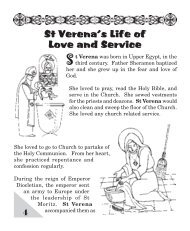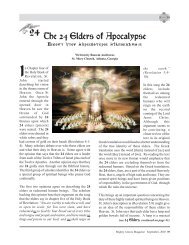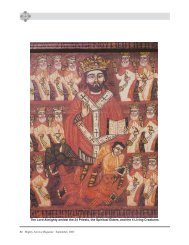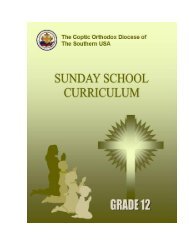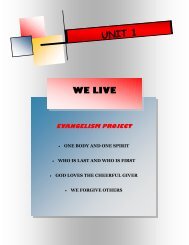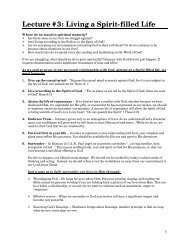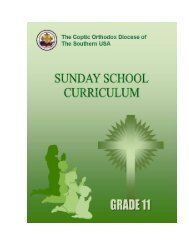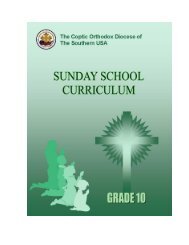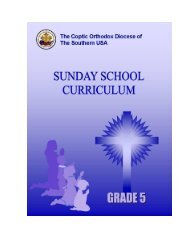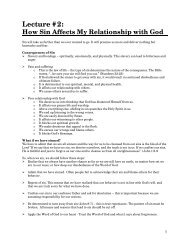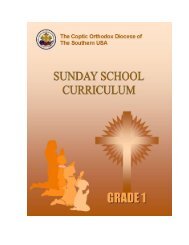LIFE.GOD.TRUTH.FOR COPTIC YOUTH Fall 2010 V olum e 9 No. 1
LIFE.GOD.TRUTH.FOR COPTIC YOUTH Fall 2010 V olum e 9 No. 1
LIFE.GOD.TRUTH.FOR COPTIC YOUTH Fall 2010 V olum e 9 No. 1
Create successful ePaper yourself
Turn your PDF publications into a flip-book with our unique Google optimized e-Paper software.
<strong>Fall</strong> <strong>2010</strong> V<strong>olum</strong>e 9 <strong>No</strong>. 1<br />
<strong>LIFE</strong>.<strong>GOD</strong>.<strong>TRUTH</strong>.<strong>FOR</strong> <strong>COPTIC</strong> <strong>YOUTH</strong><br />
Galatians<br />
6:14
A PUBLICATION OF THE<br />
<strong>COPTIC</strong> ORTHODOX DIOCESE<br />
OF THE SOUTHERN<br />
UNITED STATES<br />
President<br />
The Almighty God<br />
Vice President<br />
His Grace Bishop Youssef<br />
Editor-in-Chief<br />
Marilyn Ekladios<br />
Associate Editor<br />
Monastic Servant<br />
Contributing Editors<br />
Justine Ekladios<br />
Carine Iskander<br />
Freda Masoud<br />
Sarah Mathoslah<br />
Special Featured Article<br />
H. G. Bishop Youssef<br />
Contributing Writers<br />
Miena Armanious<br />
Irene Bakheet<br />
Victor Beshir<br />
Maria Fawzy<br />
Kirlos Haroun<br />
James Helmy<br />
Maria Mansour<br />
Christine Massoud<br />
Mareya Naguib<br />
Webmaster/Tech Support<br />
Mina Abdalla<br />
Mission Statement<br />
We, the magazine staff, have a<br />
mission regarding you, the<br />
reader: to encourage you on<br />
your Christian walk and to<br />
strengthen you through articles,<br />
answers, and more about God’s<br />
very special plan for you.<br />
Material Submission: By submitting<br />
letters and other materials<br />
to Mighty Arrows Magazine, you<br />
agree that the materials submitted<br />
are the property of Mighty<br />
Arrows Magazine and will not be<br />
returned, and you agree that<br />
Mighty Arrows Magazine, its<br />
assigns and licensees, have<br />
been granted the non-exclusive<br />
right to use and/or reproduce<br />
the materials in any manner<br />
and for any purposes.<br />
“Like arrows in the hand<br />
of a warrior, so are the children<br />
of one’s youth” Psalm 127:4<br />
My Dear Beloved Youth,<br />
In the Name of the Father, the Son, and the Holy Spirit, One God, Amen!<br />
In this issue of the Mighty Arrows Magazine, we will share and discuss with you the power, the strength,<br />
the joy, the courage, the wisdom, and the beauty of the Holy Cross. This season in the church is commenced<br />
by the Coptic New Year (1727) in which we celebrate the era of the holy martyrs who courageously<br />
and lovingly shed their blood so that we of future generations can enjoy the church and deliver<br />
it to other future generations in the same manner and care. In the amazing lives of the martyrs, we see<br />
the power of the Holy Cross and the joy by which they lived by it.<br />
This blessed season also marks another significant commemoration: the Martyrdom of the great Saint<br />
and Forerunner, John the Baptist. He bore many titles as one alone was not sufficient to describe the<br />
impact his life would have on the repentant and the faithful as they journey their way unto Salvation<br />
through the Holy Sacraments beginning with Holy Baptism. These are the kind of servant leaders who by<br />
the grace of God have empowered those who serve in the ministry and helped the church to flourish in<br />
spirituality regardless of monetary or political adversities.<br />
We ought to remember that each day is an opportunity for renewal. We put to rest the former pains and<br />
trials of each day with prayer and closure, thus, beginning each morning, we look towards the world<br />
around us with hope, optimism, and love. If we choose to see God in everything and in everyone, he will<br />
surely reveal Himself. Therefore, we ought not to be disheartened by the challenges of the day, the setbacks,<br />
and even the rejections. In His awesome economy, we stand confident in His unfailing love, never<br />
defeated by our inadequacies. We rest upon His willingness to heal our weaknesses, His delight in every<br />
effort we make to persevere in His love, and His strength to overcome temptation and evil by His Grace.<br />
I pray that you will continue in awareness of the immense blessings that surround you at all times. When<br />
in fear or doubt, do not be afraid to call upon your friends who are the angels and saints and request<br />
their aid. The Holy Cross is our badge of honor, whether it is the one you wear or the one you bear.<br />
Glory to the Holy Trinity, forever, Amen!<br />
God bless you,<br />
Bishop Youssef<br />
Coptic Orthodox Diocese of the Southern United States<br />
RECOMMENDED READING BY HGBY:<br />
"Martyrdom in Christianity" by the late H.G. Bishop Youanis<br />
Excerpt:<br />
"Besides the care of the Church—congregation and servants—for confessors and martyrs<br />
from the material, psychological and spiritual aspects, the Church tried to charge the emotions<br />
of the believers and motivate their feelings, love, and longing toward God through the<br />
writings of some of its leaders and instructors urging martyrdom. Whoever peruses these<br />
writings will perceive the burning enthusiasm, the ideal spirituality and the glory waiting for<br />
martyrs. Among the most outstanding fathers and instructors who dealt with this subject and<br />
who lived amidst the fire of persecution were Scholar Origen, Scholar Tertullian, and martyr<br />
St. Cyprian."<br />
2
FALL <strong>2010</strong><br />
CONTENTS<br />
O John, Son of the Promise<br />
Mareya Naguib 4<br />
Dialogue with a Young Man: Life is Lifeless<br />
Victor Beshir 5<br />
Rare, Medium, or Well-Done<br />
Miena Armanious 6<br />
Wisdom for Real Life<br />
Christine Massoud 7<br />
Pillars of our Time:<br />
Ordinary People Serving in Extraordinary Ways<br />
Tamav<br />
Maria Fawzy 8<br />
Question/Answer on Marriage 8<br />
Search the Holy Scriptures 8<br />
Contemplations on the Historical<br />
Significance of the Cross<br />
H. G. Bishop Youssef 9<br />
Photo Gallery 10<br />
Getting to Know the Fathers of the Church:<br />
An iInterview with St. Clement of Alexandria<br />
James Helmy 12<br />
Modern Psychology & Orthodox Theology<br />
“Expressing Anger-Negotiating the Inevitable Conflict”<br />
Balswick & Balswick 13<br />
SUBSCRIPTION RENEWAL NOW DUE!!!!!!!!!<br />
Please choose one of the following:<br />
_____ 1. Mighty Arrows Magazine Online. <strong>No</strong> Cost.<br />
_____ 2. EMagazine—Sent to your preferred email. <strong>No</strong> Cost.<br />
Email: _____________________________________________<br />
_____ 3. Receive Mighty Arrows Magazine to mailing address.<br />
Annual suggested subscription fee:<br />
US $30.00 annual subscription if mailed within the US<br />
US $35.00 annual subscription for international mail<br />
Name & Mailing Address<br />
__________________________________________________<br />
__________________________________________________<br />
__________________________________________________<br />
Annual Subscription $30.00 (US) ___Check Encl. ___Online<br />
Annual Subscription $35.00 (Int.) ___Check Encl. ___Online<br />
(Credit Card Required for Online Subscriptions)<br />
Please make checks payable to:<br />
Coptic Orthodox Diocese of the Southern US<br />
Mail to: Mighty Arrows Magazine<br />
Coptic Orthodox Diocese of the Southern US<br />
P. O. Box 1005<br />
Colleyville, TX 76034<br />
*Annual subscription renewal will begin every September. Subscriptions<br />
may be prorated at US $7.50 (US) or US $8.75 (International) per magazine<br />
issue for the remaining balance if subscribed after September.<br />
Thank you for your prayers and support of this ministry.<br />
Servants in Christ,<br />
Mighty Arrows Magazine Staff<br />
The Cross in My Pocket<br />
Poem (Anonymous)<br />
Submitted by Maria Mansour 13<br />
Greetings from Afar<br />
Irene Bakheet 14<br />
Kirlos Haroun<br />
Events, Activities, & Announcements 15<br />
3
Repentance has great value in the eyes of God, as<br />
depicted in Psalm 51:17, “A broken and a contrite<br />
heart… God… will not despise.” God is happier when<br />
His children note the error of their ways and seek to be<br />
purified of their sins. St John the Baptist cried in the wildness,<br />
urging the people to wake up and repent since the<br />
Kingdom of God was near. In Hebrew, the word<br />
“repentance” means “turn.” According to St. John the Baptist,<br />
repentance is clearly not something that can simply<br />
blossom in a heart full of emotions and good intentions. It<br />
has to be proven. The “turn” is a return back to God in obedience<br />
and trust. To obey God means following the Law<br />
and His will to do good. Through this, God grants remission<br />
of sins, saving the righteous from condemnation in the Final<br />
Judgement.<br />
However, one’s repentance is incomplete unless it<br />
goes hand-in-hand with confession. People must confess<br />
their sins to their father of confession so that they can receive<br />
the absolution. The Christian individual is then completely<br />
purified and can, thus, once again continue on the<br />
path towards the kingdom of heaven. People were baptized<br />
by St. John, confessing their sins, so that they might be<br />
prepared to receive the Messiah. Confession of sin was a<br />
sign of repentance that is essential to baptism. St. John's<br />
baptism was for remission of sins only, purifying people for<br />
the coming of the Messiah and helping to deliver them from<br />
the wrath that is to come. It did not, however, confer regeneration<br />
nor adoption as children of God, as does Christian<br />
baptism.<br />
O John,<br />
Son of the Promise<br />
By Mareya Naguib<br />
Many youth dislike confessing to their father of confession<br />
and argue that it is good enough to feel guilty and<br />
to confess their sins to God alone. This is a misunderstanding.<br />
When we were baptized, we were given citizenship<br />
into heaven and we, dressed in purity, were pronounced<br />
God’s children. However, as we grew older in the world, we<br />
began to fall into many sins and the purity of our minds and<br />
hearts collapsed. This is why we need the sacrament of<br />
confession, because it restores us to our original pure state<br />
that was attained immediately after baptism. Every time we<br />
confess our sins, it is like our baptism, and our garments<br />
turn back to being whiter than snow.<br />
As we begin to celebrate a new Coptic year, we are reminded<br />
of the story of the great hero, St. John the Baptist.<br />
On Tout 2 nd , the forerunner and great prophet, St. John the<br />
Baptist, son of Zacharias the priest, was martyred by King<br />
Herod’s orders. His life consisted of preaching and crying<br />
out to the people to weep for their sins and to "repent, for<br />
the kingdom of heaven is at hand!" (Mt 3:2). The two main<br />
messages that St. John the Baptist gave are those of repentance<br />
and confession. It is with those two actions that<br />
one can move closer to the heavenly gates of the Kingdom<br />
of God.<br />
As the New Year begins, we must all turn back and<br />
try to be better people so that we can be with Christ forever.<br />
We must learn from St John the Baptist to always<br />
repent and to confess. For “if we confess our sins, He is<br />
faithful and just to forgive us our sins and to cleanse us<br />
from all unrighteousness” (1 Jn 1:9). Let us begin the New<br />
Year with a clean and pure heart so that we may fight the<br />
good fight and continue in steadfastness throughout the<br />
race.<br />
Synexarium: Vol. 1, pg 3<br />
4
Dialogue with a Young Man: My Life Is Lifeless<br />
By Victor Beshir<br />
Youth: Do you have a few moments to talk? (This is how this young man stopped to address me. His face looked tired, as if he had not slept for<br />
days. Since he had never asked to talk to me before, I concluded that this must be about something important.)<br />
Servant: With pleasure my friend.<br />
Youth: Since I know you tell the truth, I came to ask you a question that, not only bothers, but tortures me. (He stopped for a moment as if he was<br />
trying to pick the right words to formulate his question. Then he asked), Is life worth living?<br />
Servant: Why do you ask this question?<br />
Youth: Because I feel like my life is lifeless, full of emptiness. <strong>No</strong>thing has succeeded in giving me a sense of deep happiness.<br />
Servant: Are you familiar with natural laws?‖<br />
Youth: You mean the natural consequences of our actions.<br />
Servant: Yes. <strong>No</strong>w, if I expose myself to extreme heat or extreme cold, I will get sick, right? Likewise, if I eat spoiled food I will get sick.<br />
Youth: Yes, I agree.<br />
Servant: Good. Life is the same. We need to make choices every day. If our choices are good, then we will harvest satisfaction and happiness.<br />
However, if our choices are sinful, evil, or against the natural law of giving, then we will harvest unhappiness.<br />
Youth: What do you mean by ‗the natural law of giving‘?<br />
Servant: Look around you: the sun rises daily to give light and warmth; rain freely showers the earth with water for humans, animals, and plants;<br />
oxygen is available to all without charge to sustain life; the morning breeze travels the earth to give freshness to all. There are millions of natural<br />
things that give freely to each creature individually, or to all creatures collectively, in order to sustain life. Therefore, we can come to the conclusion<br />
that giving leads to positive actions toward sustaining life and consequently toward happiness. <strong>No</strong>w you can understand why Christianity praises<br />
the act of giving, as St. Paul says: ‗And remember the words of the Lord Jesus, that He said, “It is more blessed to give than to receive‘‘ (Acts<br />
20:35).<br />
Youth: I never realized that giving could be a secret path to<br />
happiness. But I can achieve this easily.<br />
Servant: How?<br />
Youth: I will participate in some of the United Way programs to<br />
help children, the elderly, or the sick.<br />
Servant: Wonderful! However, keep in mind that you can give,<br />
not only through a charitable organization, but also to all the<br />
people you deal with on a daily basis.<br />
Youth: Do you mean my parents or siblings? I do not have anything<br />
to give to my parents.<br />
Servant: It seems that you understand giving as a solely materialistic<br />
matter; materialistic giving is just one aspect of giving.<br />
There is another, greater type of giving that is non-materialistic.<br />
Your parents need hugs, acceptance, and words of thanks; listening<br />
to and spending time with them will have more value than<br />
materialistic giving. For your siblings, colleagues, and others,<br />
allow time to listen, to uplift, to support, to provide a shoulder to<br />
cry on and a heart to rest on. Love them and give to them whenever<br />
you can.<br />
Youth: I have never said a word of gratitude to my parents. I left<br />
them a few years ago. I never understood them.<br />
Servant: Again, think back to the importance of choices; you<br />
can choose to listen to them, to accept them as they are even<br />
though they are different, to understand their world which is<br />
surely different from yours, and to put yourself in their shoes.<br />
Youth: (The young man started to smile) I will go and do this<br />
and I will let you know what happens.<br />
“I call heaven and earth as witnesses today<br />
against you, that I have set before you life and<br />
death, blessing and cursing; therefore choose<br />
life, that both you and your descendants may<br />
live” (Dt 30:19).<br />
5
Rare, Medium, or Well-Done?<br />
By Miena Armanious<br />
I still remember when I was first asked that question; I even remember the whole dialogue. A friend invited me out for dinner. It was my first week in the<br />
United States and I was still trying to understand how things run in this country. This is how it went:<br />
Writer: I will try the rib-eye steak.<br />
Waiter: Do you want it with soup or salad?<br />
Writer: Salad will be fine.<br />
Waiter: What kind of salad do you want?<br />
Writer: Mmmm, green salad will be fine.<br />
Waiter: What dressing do you prefer?<br />
Writer: (Internally: Mmmm, Isn‘t it just olive oil and vinegar?) What kind of dressing do you have?<br />
Waiter: We have Caesar, ranch, vinaigrette, thousand island, blue cheese…<br />
Writer (Internally: Oh My Lord! I did not recognize any of the names that he said.) What was the first one?<br />
Waiter: Caesar?!<br />
Writer: I will try the Caesar one.<br />
Waiter: You also have a choice for one side.<br />
After I picked something from the menu, I thought I was done! But here came the question that struck me most: ―Sir, how do like your meat?‖<br />
I remember very well that I originally misunderstood the question, thinking that he was wondering how much I liked meat, which seemed awkward.<br />
Luckily, my American friend made it clearer, ―How do you like your meat cooked: rare, medium, or well done?‖<br />
At that moment, I was speechless, not because I did not know what I want as before, but because I felt there is no limit to choices, thinking ―Truly, this is<br />
the land of freedom!‖<br />
It is very interesting how we associate freedom with the number of choices or the different options that life offers to us. It is a very well established<br />
concept in the minds of many Americans and Egyptians alike. But I also think that it is a concept that dwells first within our earthly human nature<br />
before it manifests itself as part of the culture. On a more personal level, I always find the idea that I still have many options in my life a very pleasant<br />
idea. It makes me feel that I am still free and in control of my life. I sometimes even do not make a choice because I know that once I do, I give away my<br />
freedom to choose! It is a very depressing idea, isn‘t it? However, it explains why the commitments to choices we make in life are hard to keep; we are<br />
giving away our freedom.<br />
There is also the other extreme, which I call the ―Don‘t-miss-the-chance!‖ misconception. It is always driven by the fear of losing what life offers<br />
us at the moment; what is offered today might not be available tomorrow! Therefore, we rush in making decisions when patience is asking us to<br />
wait. As Christ said, ―By your patience possess your souls!‖ (Lk 21:19)<br />
What should we do then? To answer this question, I need to address the essence of the problem: it is our definition of liberty or what we call<br />
freedom. Liberty is a state that manifests itself in different ways in our lives, namely spiritual and materialistic manifestations. As humans, we lean more<br />
towards the materialistic manifestations, simply because we do not need much effort to sense them. In some way, these materialistic manifestations go<br />
very well, sometimes perfectly, with our carnal nature. On the other hand, the effect of any materialistic stimulus does not stay long enough after the<br />
stimulus fades away. This creates a dilemma in our minds because many times, we make choices that should make us happy and satisfied but these<br />
feelings do not last long. Interestingly, this dilemma is resolved when we look at the spiritual aspect of liberty. From a Christian point of view, the human<br />
nature cannot coexist in a state of liberty and a state of sin. In a state of sin, we simply cannot say, ―<strong>No</strong>!‖ to our carnal desires; we are just slaves to<br />
chemicals and hormones in our bodies that control us. I wonder how different from animals we are at this point. Maybe we are more sophisticated in<br />
responding to these chemicals, but definitely not free. I would say we act more like a better-programmed robot! 2 Pet 2:19 says, ―While they promise<br />
them liberty, they themselves are slaves of corruption; for by whom a person is overcome, by him also he is brought into bondage.‖ A very sad picture,<br />
isn‘t it? Christianity does not leave us with this negative picture, but rather offers the way out; ―For you, brethren, have been called to liberty; only do not<br />
use liberty as an opportunity for the flesh, but through love serve one another.‖ (Gal 5:13)<br />
St. Paul, the apostle, made it very clear in 2 Cor 4:18 when he said, ―We do not look at the things which are seen, but at the things which are<br />
not seen. For the things which are seen are temporary, but the things which are not seen are eternal.‖ We seek liberty through the unseen choices, but<br />
by doing so we cut down the number of the ―seen‖ choices that we have. ―As poor, yet making many rich; as having nothing, and yet possessing all<br />
things.‖ (2 Cor 6:10)<br />
An earthly freedom might be a choice between rare, medium, or well done. True freedom is to be able to say and practice what St. Paul said<br />
in 1 Cor 8:13, ―Therefore, if food makes my brother stumble, I will never again eat meat, lest I make my brother stumble.‖<br />
We’d love to hear about<br />
your news and events. Send<br />
us your pictures and a caption<br />
describing the occasion:<br />
mightyarrowmagazine@suscopts.org<br />
6<br />
2 Tim 4:8<br />
S.U.S.B.L.<br />
Basketball<br />
League<br />
<strong>2010</strong><br />
Orlando, FL
Wisdom for REAL life: Who am I?<br />
By Christine Massoud<br />
As we approach the beginning of a new year (Coptic year that is), I<br />
would like to introduce a new series: Wisdom for REAL life. I can‘t remember<br />
the number of times I have asked myself as I read verses or<br />
heard sermons, ―<strong>No</strong>w how is that suppose to apply to me?‖ Well, I hope<br />
to use this series to do just that.<br />
Do you sometimes take stock of the many hats you wear, and<br />
think, ―I‘m a student, a teacher, a sister, a brother, a cook, a friend, a<br />
business professional – not to mention the president of <strong>No</strong> One Knows<br />
How To Do Anything Right Unless I Do It Myself, Inc. – so why is it,<br />
then, that even with this full house of roles, I still wonder about who I<br />
am?‖ Many of us think this very same thing. And so, off we go on a<br />
search to find the ―real me.‖ We seek the advice of our friends and of the<br />
gurus of the self-help world, all who send us on wild-goose chases to set<br />
boundaries, better manage our time, or build our self-esteem. We buy a<br />
new Day-Timer, demand our fair share of daily hugs, and learn to tell<br />
our selves ―I love me‖ more. But still we end up wanting. Why? Because<br />
the search for self-identity is not about self-esteem. It is neither a mystery<br />
nor an elusive truth; it is simply the acceptance of one‘s self. Selfacceptance<br />
is one of the concepts least talked about in Christianity today.<br />
Why? Because we simply accept that we are sinners. But does<br />
accepting this fact mean that we will sin more or less? The verdict is out.<br />
The majority claim yes. But, what if I say that I am a sinner who has<br />
been forgiven? <strong>No</strong>w, if I accept that, does it mean that I will sin more or<br />
less?<br />
The answer definitely falls back to our foundation and our<br />
beliefs. But that‘s where the search begins. What do you believe about<br />
yourself? When no one is watching, who are you really? Are you someone<br />
who happened by chance? Were you put on this planet for a purpose?<br />
What do you really believe? You see, the focus here has shifted<br />
very quickly to your fundamental beliefs, because without fundamental<br />
beliefs how will you ever know who you are? For example, I went to the<br />
store the other day and was not charged for a pack of sodas I had at the<br />
bottom of my cart. Do I go back, stand in line again, and ask to pay? Or<br />
do I take the pack thinking that I already paid, in a way, because this<br />
store overcharges me for everything else? There are only two choices<br />
here: pay or don‘t pay. How does belief affect this situation? I believe I<br />
am an honest person; THERE<strong>FOR</strong>E, I will go back and pay for what I<br />
have. Can everything in life be black and white like this? Wisdom has<br />
7<br />
taught me that it cannot. But the truth of the matter<br />
is, when you KNOW what you believe, you can easily<br />
BE.<br />
Finding ourselves is about acknowledging a simple<br />
truth: regardless of the roles we‘re acting out or the<br />
circumstances of our lives, we are each, quite simply,<br />
a soul in search of our Creator. Shaped in God‘s<br />
image, imbued with a soul that has eternal value,<br />
―who we are‖ is, for each of us, “a child of our heavenly<br />
Father, an heir to His kingdom” (Gal 4:7). <strong>No</strong>w<br />
stop here. Did you have a hard time reading this<br />
statement? Be honest with yourself: that‘s the first<br />
step. Do you truly feel that you are a son or daughter<br />
to Almighty God? Don‘t take it at face value, but stop<br />
and consider. Ask the hard questions, and challenge<br />
yourself and your faith. God wants us to know for<br />
sure, beyond a shadow of a doubt, that we are loved<br />
as children and heirs to His kingdom. To be honest<br />
with you, this statement is hard for me to read as<br />
well. But I have asked God, in sincerity, to show me<br />
who He is. Show me Your glory, Lord. And don‘t<br />
think, for one second, that the God who created you, and even died to<br />
grant you the freedom to worship or reject Him, will ignore that request.<br />
If you are strong in faith, pray for others who don‘t see him. Pray that, in<br />
His time, He draws them near to Him.<br />
There is great wisdom in knowing who we are. <strong>No</strong>thing could<br />
be more important than to ask, ―Who am I?‖ And nothing is more freeing<br />
than knowing who you are. But you should not be satisfied with just<br />
knowing, just repeating over and over what you were told about yourself.<br />
That can be a two-edged sword. If you are told great and wonderful<br />
things about yourself, but they are exaggerated, then you become high<br />
and mighty in your own eyes and only in your eyes. But on the other<br />
hand, if you are told negative lies and put downs, you will lose all sense<br />
of self worth. Listen to those who have nothing to gain from telling you<br />
how and who you really are. One of them is God. God is unchanged by<br />
our actions, never surprised or shocked by events that take place, yet<br />
His Words are the best self-help ever written.<br />
Whether life showers down roses or rains only their thorns, the<br />
person we see staring back in the mirror is the same: the same person<br />
who was given this awesome privilege of knowing God, of standing in<br />
His courts, of seeing His mighty works, and of always having His love as<br />
a son or daughter. Accepting this birthright means that, in spite of many<br />
twists and turns in the roads our lives take, we know who we are. We<br />
must know and live who we are. It is an obligation—an honor, but not a<br />
burden—to reflect God‘s love.<br />
During those questioning times—would the real me please<br />
stand up?—remind yourself of who you really are. You may be many<br />
things to many people, but the grace, strength, love, and leadership you<br />
bring to these roles look and feel different when you are clear about your<br />
true identity.<br />
―Dear God, as busy as I am and as one day most assuredly<br />
melts into the next, I sometimes ask myself if there is more to life than<br />
the many hats I wear. I know that I am needed, wanted, and loved. Still,<br />
on some days, God, it feels like something is missing in my life. I do<br />
know that You are my God and I am Your child—an heir. Your heir. On<br />
those days when the world drowns out my knowledge of who I am,<br />
please remind me, heart to heart, that, apart from all that I am on this<br />
planet, believing in You first gives rise to my true identity—an awesome<br />
identity. Thank You for this enormous gift and for the price paid for it<br />
through Your beloved Son. Amen.‖
SEARCH THE HOLY<br />
SCRIPTURES<br />
HOLY BOOK OF GENESIS<br />
Chapter 29<br />
What is the irony in the younger/older<br />
role reversal in Jacob's life?<br />
Chapter 32<br />
Did Jacob need to be afraid of Esau?<br />
Why or why not?<br />
ANSWER TO A BIBLE QUESTION<br />
from the previous issue<br />
What wrong doing did Isaac, Rebecca, Esau, and<br />
Jacob commit?<br />
Isaac preferred Esau over Jacob.<br />
Rebecca deceived her husband by helping Jacob impersonate Esau.<br />
Esau did not value his birthright.<br />
Jacob lied to his father.<br />
By Maria Fawzy<br />
Marriage<br />
How do we know when a person is emotionally<br />
mature and ready for marriage?<br />
Your spiritual father will be the<br />
gauge to assess your emotional<br />
and spiritual readiness.<br />
When a young man is emotionally<br />
and financially ready to<br />
establish a household, he<br />
should solicit his spiritual father's<br />
guidance, and that of his<br />
own parents. A young woman,<br />
as well needs to consider her<br />
own obligations and also consult<br />
her spiritual father and her<br />
own parents. When Abraham,<br />
Isaac's biological and spiritual<br />
father, saw that it was the right<br />
time to seek a wife for his son,<br />
he gave specific instructions to<br />
which Isaac and Rebecca complied;<br />
thus reaping the fruit of<br />
obedience and experiencing<br />
love and romance in their successful<br />
marriage (Genesis 24).<br />
Tamau<br />
As an Egyptian newspaper mentioned, the week of her departure to our Father,<br />
Tamav Erini was ―A woman who lived a life of light!‖ She was a precious pillar to<br />
our generation. Ever since her birth in February of 1936, she was a chosen fruit,<br />
and her mission was clearly assigned. ―She is not yours; she is ours, but look after<br />
her and bring her up properly,‖ were the words of St. Mary when she appeared to<br />
Tamav Erini‘s mother while in labor. Her family lived a life full of glorification and<br />
praise to our Savior and had living relationships with the saints, including many<br />
apparitions and conversations. Tamav Erini was no different; she had a very special<br />
relationship with Abu Seifein.<br />
Tamav Erini was passionate about the monastic life from a young age,<br />
and at the age of 18 she started her mission at the convent. In 1962, after the departure<br />
of the mother superior of the convent, Tamav Erini, the youngest of all the<br />
nuns, was dragged and pushed in tears to the church to be ordained by His Holiness<br />
Pope Kyrillos VI, as the next mother superior who is responsible for the convent<br />
of Abu Seifein. She had previously refused the position of leadership because<br />
she felt it impossible that she become mother superior as a youth, but this was the<br />
will of God.<br />
Through fervent prayers, fasting, and metanias, Tamav Erini sought to<br />
revive the monastic life and established needed monastic disciplines. Amongst<br />
many others, Tamav Erini established the communal table, laid the foundation of<br />
the Pachomian communal life, established a library for the nuns, and built<br />
several churches at the convent. Tamav Erini lived a<br />
life full of spiritual<br />
depth and desire to grow more and more in Christ. She<br />
even desired to be a martyr for Christ‘s sake and<br />
fervently<br />
asked for it in prayer. According to her request, God willed<br />
that she suffer sickness and undergo pain and<br />
suffering<br />
for His sake. She accepted the sickness and<br />
disease<br />
with joy and marvel. Throughout the pain<br />
and<br />
suffering, she was thankful and glori-<br />
fied<br />
God until her last breath. Her heav-<br />
enly<br />
wedding was on <strong>No</strong>vember of 2006.<br />
May her prayers be with us. Amen.<br />
8
H. G. Bishop Youssef<br />
Coptic Orthodox Diocese of the Southern US<br />
Crucifixion, as a method of punishment, was in<br />
use among the Egyptians in the Old Testament,<br />
"Within three days Pharaoh will lift off your head<br />
from you and hang you on a tree and the birds<br />
will eat your flesh from you" (Genesis 40:19).<br />
The Holy Book of Esther (7:10) reveals that the<br />
Carthaginians and Persians also utilized crucifixion<br />
to punish their criminals. "So they hanged<br />
Haman on the gallows that he had prepared for<br />
Mordecai. Then the kings' wrath subsided." It is<br />
commonly known that the Greeks and Romans<br />
used crucifixion from the earliest of times. That<br />
is why perhaps many scholars believe that the<br />
Jews learned the concept of crucifixion from the<br />
Romans.<br />
In addition to its being documented in the Old<br />
Testament as a painful instrument of death the<br />
cross is also documented in the New Testament<br />
and in the writings of Church Fathers.<br />
In the New Testament times, in particular, crucifixion<br />
was purposefully meant to be a demeaning<br />
way in which to die. It was reserved for the<br />
vilest of criminal acts, as an emblem of a disparaging<br />
slave or servants' death, and a murderers'<br />
punishment. Degradation was an added dimension<br />
of the cruel infliction. The cross was to all a<br />
symbol of the profoundest horror.<br />
There are now thought to be three different<br />
forms of crosses used for crucifixion during Biblical<br />
times. The first resembled the small letter "t",<br />
the second formed the capital letter "T", and the<br />
third was in the form of an "X".<br />
Most Biblical scholars believe that the cross,<br />
which the Lord Jesus Christ suffered upon, was<br />
a Latin cross in the form of the small letter "t".<br />
The Latin cross, "t", had an upright beam above<br />
the cross bar, on which a "title" could be placed.<br />
There was a projection from the central stem of<br />
the cross, which the body of the sufferer could<br />
rest upon. This was not to provide occasional<br />
relief from suffering but the purpose of the projection<br />
was to prevent the weight of the body<br />
from tearing the hands away.<br />
Other scholars refer to the Lord Jesus Christ's<br />
Holy Cross as in the form of the capital letter,<br />
"T". <strong>No</strong> one alludes to His cross as being in the<br />
form of "X".<br />
Barnabas (c.70-130) writes, "The cross was to<br />
express grace by the letter "T".<br />
Victims were flogged and then forced to walk to<br />
the site of their impending death dragging the<br />
beam of the cross on which they were to be<br />
hung. <strong>No</strong> one could bear to carry the full weight<br />
of the heavy cross prepared for the purpose of<br />
crucifixion. The one to be crucified was also<br />
stripped naked of all his clothes to further add to<br />
the humiliation. At the designated crucifixion site<br />
the victim was nailed through his wrists and<br />
ankles to the wooden cross, which he had been<br />
forced to drag.<br />
Tertullian (c. 197) writes concerning the Lord<br />
Jesus Christ's crucifixion, "He said unto him,<br />
'Pass through the midst of Jerusalem and write<br />
the sign of "Tau" on the foreheads of the men<br />
who groan and grieve over all the enormities<br />
that are done in their midst" (Ezekiel 9:4). <strong>No</strong>w<br />
the mystery of this sign in which the foundation<br />
of life was prepared for mankind, was in various<br />
ways predicted.<br />
The Greek letter "TAU" is equivalent to the English<br />
capital letter "T" which is in the shape of the<br />
cross.<br />
Death upon the cross was meant to be mercilessly<br />
slow and agonizing. Death by crucifixion<br />
usually resulted from suffocation, after the crucified<br />
became too exhausted to pull himself up in<br />
order to breathe. Crucifixion could entail pain,<br />
dizziness, abdominal cramps, muscle cramps,<br />
thirst, starvation, fever, tetanus, tormenting<br />
crowds, and prey attracted to unattended<br />
wounds. It has been documented that the consequences<br />
of crucifixion could potentially be<br />
body rot as a result of the sun and rain or being<br />
devoured by the birds and surrounding countryside<br />
beasts.<br />
With the crown of thorns upon the Lord Jesus<br />
Christ's Holy head and a mocking crowd below<br />
Him anxious to witness His death,, the humiliation<br />
of the Lord Jesus Christ was completed on<br />
the Holy Cross.<br />
Besides the Lord Jesus Christ Himself, the<br />
Apostles St. Peter, St. Andrew, St. James the<br />
Less, and St. Simon were also crucified.<br />
On the Feast Day of the Discovery of the Holy<br />
Cross by Queen Helena, mother of Emperor<br />
Constantine the Great, underneath amassed<br />
accumulated rubble on Golgotha, let us reverently<br />
remember the circumstances of our Lord's<br />
death and His great and surpassing love for us<br />
all.<br />
Let us all take a moment to lift up our eyes toward<br />
the Holy Cross in remembrance of St. Helena's<br />
finding of the True Cross of our Lord Jesus<br />
Christ:<br />
"<strong>No</strong>w there stood by the cross of Jesus His<br />
mother, and His mothers' sister... and Mary<br />
Magdalene. When Jesus therefore saw his<br />
mother, and the disciple standing by, whom He<br />
loved, He said to His mother, „Woman behold<br />
your son!‟ Then He said to the disciple, „Behold<br />
your mother!‟ After this, Jesus knowing that all<br />
things were now accomplished, that the Scripture<br />
might be fulfilled, said, I thirst and they filled<br />
a sponge with vinegar, and put it upon hyssop<br />
and put it to His mouth. When Jesus therefore<br />
had received the vinegar, He said „it is finished‟:<br />
and He bowed His head and gave up the spirit<br />
upon the Holy Cross" (John 19:25-30).<br />
The cross, as the bearer of the humiliation of the<br />
Lord Jesus Christ, remains with us today still<br />
bearing the same message as it did the day of<br />
the Lord's most Holy death, "The message of<br />
the cross is foolishness to those who are perishing,<br />
but to us who are being saved it is the<br />
power of God" (I Corinthians 1:18).<br />
9
12th Annual Evangelism Conference<br />
St. Stephen’s Retreat Center, Titusville FL<br />
Bolivia<br />
Mexico<br />
Greece & Turkey<br />
South Africa<br />
10
CONGRATULATIONS<br />
Consecrations & Grand Openings<br />
St. Philopateer<br />
Dallas, TX<br />
St. Mary<br />
Del Rey Beach, FL<br />
St. Stephen Christian Retreat Center, Titusville FL<br />
11
Getting to Know<br />
the Fathers<br />
of the Church<br />
An Interview with<br />
St. Clement<br />
of Alexandria<br />
By James Helmy<br />
Interviewer: Fr. Clement, it is truly an honor! A<br />
resident of the great city of Alexandria, home to<br />
the largest and best-equipped libraries, the<br />
richest museums, the biggest theaters, the<br />
longest race track, and the finest philosophers<br />
the world has ever seen! Here was where the<br />
Septuagint was translated, where the first<br />
Christian university was opened, and where the<br />
greatest defenders of Orthodoxy were born and<br />
bred. I must confess it is rather intimidating to<br />
talk with a mind that was nurtured in that great<br />
city. I thank you for agreeing to speak with<br />
someone so unworthy of your time as a modern<br />
journalist.<br />
St. Clement: The honor is mine. I truly admire<br />
you.<br />
Int: For what? This is the first time you have<br />
met me.<br />
S.Clem: Believe me, I sincerely consider that<br />
any 21 st century individual who takes the time<br />
to sit and discuss the ideas of a Church Father<br />
who lived about 19 centuries earlier is a very<br />
rare and wise person.<br />
Int: Thank you for your kindness. Let‘s begin<br />
with your name; I find it very interesting. Can<br />
you please tell it to me in full?<br />
S.Clem: Titus Flavius Clemens.<br />
Int: Are you aware that it is the same name of a<br />
very famous person who lived in your day?<br />
S.Clem: Yes, the Roman emperor.<br />
Int: You say it so casually. The Roman emperor—you<br />
should be proud!<br />
S.Clem: There is something you should understand:<br />
we the Christians of the early centuries<br />
paid much less attention to important people<br />
than in your days. To an early Christian, since<br />
Christ was his personal Lord and Savior, every<br />
other personality of note (rich, famous, or influential)<br />
was insignificant.<br />
Int: You are right, father. Our society has a<br />
tremendous problem with celebrity worship.<br />
S.Clem: I think I know why your generation has<br />
this problem: you have an instrument of behavior<br />
control much stronger than anything we ever<br />
imagined.<br />
Int: What is it?<br />
S. Clem: Media. It has the potential to take a<br />
person with, say, a voice just above average, or<br />
looks just above average, or even a personality<br />
way below average, and thrust him or her into<br />
the position of a god—almost a real idol. I believe<br />
you even have a television show which<br />
frankly names a certain singer or actor as a<br />
national ―idol.‖<br />
Int: Oh, but with all due respect Fr. Clement,<br />
we do not believe in idols anymore; we will<br />
never actually bow down or burn incense to any<br />
of these singers.<br />
S. Clem: Yes, but here is something else you<br />
must understand. To the early Christians, worship<br />
was not defined by a simple physical posture<br />
or action. Modern Americans adopt an<br />
idol‘s habits, his words, her clothes, his brand<br />
of shoes, her facial expressions. In effect, they<br />
become the idol‘s followers. That is worship.<br />
The Church says that you worship Christ if you<br />
adopt His teachings and way of life, not just<br />
bow down and say, ―I‘m Christian.‖<br />
Int: Interesting.<br />
S. Clem: And disappointing.<br />
Int: Hmmm…There is another point of your<br />
teaching which I would like to explore. It involves<br />
the ―New Song.‖ You once wrote:<br />
―Behold the might of the new song! It<br />
has made men out of stones, and<br />
men out of beasts. Those who were<br />
dead have come to life again, simply<br />
by listening to this song. It also composed<br />
the universe into a melodious<br />
12<br />
order, and tuned the discord of the<br />
elements to a harmonious arrangement—so<br />
that the whole world might<br />
become harmony.‖ (Exhortation ch. i)<br />
Profound words, but what exactly is this new<br />
song?<br />
S. Clem: You must first understand what was<br />
the old song? If you can think of all the myths,<br />
ideas, and customs of the ancient world as the<br />
song of ancient humanity, and that song had<br />
gone way out of tune… The old song or noise<br />
rather, was saved by the coming of the new<br />
song, which is the Word Himself.<br />
Int: You also wrote the following:<br />
He who is of David, the Word of<br />
God…by the Holy Spirit tuned the<br />
universe, and especially man—who<br />
composed of body and soul is a<br />
miniature universe—and makes melody<br />
to God on this instrument of<br />
many tunes.<br />
You are saying that God ―tuned‖ the universe to<br />
play this new song?<br />
S. Clem: Precisely—and man is the primary<br />
instrument that is tuned. For Christ is our song<br />
and hymn; and we are the strings, pipes, and<br />
vocal cords. Think of it like this: every man and<br />
woman is a musical instrument meant to play<br />
God‘s new song. The more we are in tune with<br />
the melody, the sweeter our lives sound; the<br />
more out of tune, the more discordant, and<br />
harsh will be our lives.<br />
Int: Musical instruments… I never thought of us<br />
like that.<br />
S. Clem: Yes, God loves the music; but Satan<br />
prefers noise. The more clank and clatter our<br />
lives produce, the nicer the sound to his ears,<br />
which is why I lament the prevalence of sheer<br />
noise in your society. Sweet, harmonious music<br />
has lost popularity among Americans. It is the<br />
violently disturbing blare that claims the money<br />
of the youth.<br />
Int: Well, we have run out of time. Any last<br />
words of encouragement for our readers?<br />
S. Clem: Yes: ―All this life is a holy festival‖<br />
(Stromata vii, 7).<br />
Int: Light words from someone who speaks of<br />
the world‘s problems with such grave disappointment.<br />
S.Clem: The world disappoints me, but life<br />
does not. I have learned to see the world how it<br />
is, but never to let it enter inside me.<br />
Int: How do you accomplish such a spiritual<br />
feat?<br />
S.Clem: ―Abide in Me, and I in you.‖ It is Christ<br />
living in me who overcomes. If He ever left me,<br />
I would be paralyzed by fear and despair from<br />
this world. With the Lord, any believer can be<br />
stronger on the inside than the greatest Roman<br />
emperor.
Modern Psychology<br />
& Orthodox Theology<br />
Expressing Anger<br />
Negotiating the Inevitable Conflicts<br />
Identify the issue.<br />
Choose the right time.<br />
Choose the right place.<br />
Begin with a positive stroke.<br />
Stick to the issue.<br />
Do not bring up the past.<br />
Do not hit below the belt.<br />
Take the other seriously.<br />
Express anger non-abusively.<br />
Do not play games.<br />
Do not be passively aggressive.<br />
Avoid asking for explanations of behavior.<br />
Avoid labeling and name calling.<br />
Avoid Triangles.<br />
Balswick, Jack O. & Judith K. (2007)<br />
The Family (3rd Edition)<br />
A Christian Perspective on<br />
The Contemporary Home<br />
THE CROSS<br />
IN MY<br />
POCKET<br />
I carry a cross in my pocket,<br />
A simple reminder to me<br />
That I am a Christian,<br />
<strong>No</strong> matter where I may be.<br />
This little cross isn't magic,<br />
<strong>No</strong>r is it a good luck charm.<br />
It isn't meant to protect me<br />
From every physical harm.<br />
It's not for identification<br />
For all the world to see.<br />
It's simply an understanding<br />
Between my Savior and me!!<br />
It reminds me too, to be thankful<br />
For my blessings every day,<br />
And to strive to serve Him better<br />
In all that I do or say.<br />
When I put my hand in my pocket<br />
To bring out a coin or a key,<br />
The cross is there to remind me<br />
Of the price He paid for me.<br />
It's also a daily reminder<br />
Of the peace and comfort I share<br />
With all who know my Master<br />
And give themselves to His care.<br />
So, I carry a cross in my pocket<br />
Reminding none but me<br />
That Jesus Christ is Lord of my life,<br />
If only I'll let Him be.<br />
~anonymous author~<br />
poem submitted by Maria Mansour<br />
Email us: mightyarrowsmagazine@suscopts.org<br />
Articles, Poems, & Other Inspirational Literature. 1 page or<br />
less and kindly rememberto include your name and refer-<br />
13
Dear Mighty Arrows<br />
Dispatch #1<br />
Its four o‘clock in the morning in the deserts of Naqada, and the Monastery of Archangel Michael is a small toy set in the distance<br />
for the small band of travelers that are braving the mountains of Qena. A glimpse into their adventure:<br />
"Left, right, left, right" is running through your mind as you walk on the edge of the abyss. Endless chasm to your left, merciless<br />
rift to your right and a bloodthirsty wind clawing and pulling at your clothes yearning for a little bit of color to be added to<br />
the sun-burnt brown rocks below. "Keep your eyes in front of<br />
you" is the plan, but fear creeps into your heart as the<br />
gorge to your left and right spin and twist in your peripheral<br />
into beings that can only be conceived in the darkest,<br />
most desperate nightmares. It seems that the specters<br />
of despair shall prevail when your mind reels from<br />
exhaustion and dehydration and your knees<br />
grow frail beneath you and threaten to give<br />
until you finally take your last step across<br />
the edge of doom into a holy refuge<br />
where Father John has the spirit of God<br />
waiting to wrap around you and banish<br />
the phantoms of death. Enlightened and<br />
protected, you continue your journey<br />
through risk and peril to rise at the summit,<br />
victorious!<br />
Your Friend,<br />
Review of South Africa Service Trip<br />
May 1 ST to 18 th <strong>2010</strong><br />
"The Joy of the Lord is Your Strength" (Nehemiah 8:10)<br />
Twelve dedicated servants with one heart of service embarked on a journey<br />
of eighteen blessed days in South Africa.<br />
Servants from California, Florida, Georgia, Tennessee, Texas and even Australia met<br />
at Johannesburg International Airport on May 2 to begin a journey of service, fellowship,<br />
friendship, and spirituality.<br />
We were hosted with sincere kindness and true hospitality by HG Bishop<br />
Antonious Markos. His Grace also shared with us stories of missionary and how<br />
His Grace began the service in the remote regions of Africa. His Grace was the first<br />
dedicated servant to establish churches in Africa and truly deserves the title "Father<br />
of Evangelism."<br />
HG Bishop Antonious Markos guided us to serve in Zimbabwe and the<br />
outskirts of Johannesburg to a small city called Natal. We were greeted with love<br />
and songs by the families, youth, and children.<br />
We were not only blessed to serve with HG Bishop Antonious Markos' discretion,<br />
but were exceptionally blessed to have HG Bishop Youssef among us for<br />
the entire duration of the trip! HG Bishop Youssef taught us the importance of commitment<br />
and seriousness to serve. His Grace also enlightened us that the primary<br />
reason for us to go to various places is so we may learn how to serve and bring our<br />
experiences and encounters to our own communities and parishes.<br />
Although, the trip was saturated with Nehemiah Bible Study, service, sightseeing<br />
activities, prayers, Divine Liturgies, we did not neglect to develop friendships<br />
and fellowship with each other and others and discover our God-given talents. We<br />
learned that service should be a prominent aspect in every Christian's life where<br />
ever she/he may be and we should all diligently seek to do "the work of an evangelist"<br />
(2 Timothy 5:4).<br />
Mighty Arrows<br />
SUS Diocese<br />
USA<br />
+Take Care!<br />
Irene Bakheet<br />
South Africa<br />
14
SUS DIOCESE EVENTS&ACTIVITIES<br />
RESOURCES<br />
Arabic Corner<br />
Audio<br />
Bible Study<br />
Children’s Corner<br />
Deacons<br />
Evangelism<br />
Interesting Facts<br />
Literature<br />
Questions & Answers<br />
Reading Recommended<br />
Sunday School Curriculum<br />
Youth Corner<br />
Meditations on the Cross<br />
DIOCESE PROGRAMS<br />
Family Ministry Program<br />
Pre-Marital & Newlywed<br />
Resource Ministry Program<br />
Servants/Pre-Servants<br />
Social Services<br />
St. Clement Academy<br />
Theological Seminary<br />
DIOCESE EVENTS<br />
by H.G. Bishop Youssef<br />
Youth & Adult's Book - English<br />
Paperback Pages: 80<br />
Cost: $3.50 (plus shipping & handling)<br />
Fruit of the Holy Spirit<br />
First Annual Coptic Retreat<br />
St. Stephen’s (FL) Oct. 15-16<br />
Pre-Marital Retreats<br />
TN: Oct 21-23, <strong>2010</strong><br />
TX: <strong>No</strong>v 19-21, <strong>2010</strong><br />
FL: Feb 11-13, 2011<br />
TN: Jun 24-26, 2011<br />
TX: <strong>No</strong>v 11-13, 2011<br />
Family Ministry Program (FMP)<br />
Spring Registration: December 10, <strong>2010</strong><br />
Theological Seminary Program<br />
Spring Registration: May 1, 2011<br />
Florida Family Convention<br />
<strong>No</strong>v 24-27, <strong>2010</strong><br />
WTL High School Convention<br />
Boys: Dec 20-23, <strong>2010</strong><br />
Girls: Dec 27-30, <strong>2010</strong><br />
WWF College Convention<br />
Jan 2-5, 2011<br />
TCL Graduate Convention<br />
Jan 14-17<br />
www.suscopts.org<br />
15<br />
by H.G. Bishop Youssef<br />
Youth & Adult's Book - English<br />
Paperback Pages: 96<br />
Cost: $4.00 (plus shipping & handling)<br />
SUS Diocese<br />
Bookstore<br />
Arabic & English Books<br />
by H. G. Bishop Youssef,<br />
Church Books and Many Other<br />
Books & Media Resources<br />
Order Online @<br />
http://www.suscopts.org/diocese/<br />
bookstore/
A QUARTERLY JOURNAL ~ SHARE IT WITH YOUR FRIENDS & COLLEAGUES<br />
The annual renewal of your subscription helps to sustain this ministry.<br />
For online donations to the St. Stephen’s Christian Retreat Center, or to any other Diocesan program or ministry, please refer to<br />
www.suscopts.org/diocese/donations/ and make your selection. If by check, kindly make checks payable to:<br />
Coptic Orthodox Diocese of the Southern US and indicate the program or ministry of your intended donation in the memo.<br />
Mail to: Coptic Orthodox Diocese of the Southern United 16 States; P.O. Box 1005; Colleyville, TX 76034<br />
Your kindness and generosity is greatly appreciated.


